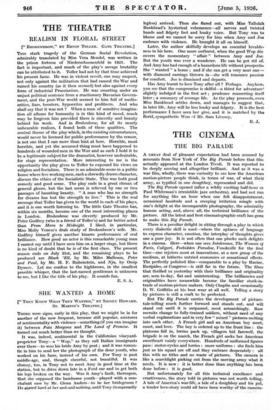THE THEATRE
REALISM IN FLORAL STREET [" BRORENBROW,” BY ERNST TOILER. GATE THEATRE.] THIS stark tragedy of the German Social Revolution, admirably translated by Miss Vera Mendel, was written in the prison fortress of Niedersehoenenfeld in 1921. The fact is important, and much of the play's savage brutality can be attributed to it. Toiler had not by that time achieved his present fame. He was in violent revolt, one may suspect, not only against the militarism that had caused the War and ruined his country (as it then seemed) but also against every form of industrial Prussianism. He was smarting under an unjust political sentence from a reactionary Bavarian Govern- ment, and the post-War world seemed to him full of medio- crities, liars, boosters, hypocrites and profiteers. And who shall say that it was not ? When a man of sensitive imagina- tion all aflame for humanity is in this kind of mood, much may be forgiven him provided there is sincerity and beauty behind his work. And in Brokenbrow, for all its nearly unbearable realism, I found both of these qualities. The central theme of the play which, in the existing circumstances, would never be licensed for public performance by the censor, is not one that I can more than hint at here. Horrible, most horrible, and yet the accursed thing must have happened to hundreds of wounded men in the War and as such I hold it to be a legitimate subject for the dramatist, however undesirable, for stage representation. More interesting to me is the opportunity the play gives to Toiler to expound his views on religion and Socialism. There is an admirable scene in a public house where five working men, each a shrewdly drawn character, discuss the ethics of the Socialistic State. This was both good comedy and good sense. The play ends in a great climax of general gloom, but the last scene is relieved by one or two passages of haunting beauty. " A man who has no strength for dreams has lost the strength to live." This is the real message that Toiler has given to the world in each of his plays, and it is one worth listening to. The little Gate Theatre has, within six months, become one of the most interesting places in London. Brokenbrow was cleverly produced by Mr. Peter Godfrey (who is a friend of Toner's) and far better acted than From Morn to Midnight. I liked, in particular, Miss Molly Veness's drab study of Brokenbrow's wife. Mr. Godfrey himself gives another bizarre performance of real brilliance. How good an actor is this remarkable young man I cannot say until I have seen him on a larger stage, but there is no kind of doubt that he is of the first class. The present season ends on July 31st, and the remaining plays to be produced are Black 'Ell, by Mr. Miles Malleson, Peter and Paul, by Mr. H. F. Rubenstein, and Nju, by Ossip Dymov. Let me confess to the highbrows, in the smallest possible whisper, that the last-named gentleman is unknown to me, but I like the title of his play. It sounds fun.
E. S. A.










































 Previous page
Previous page